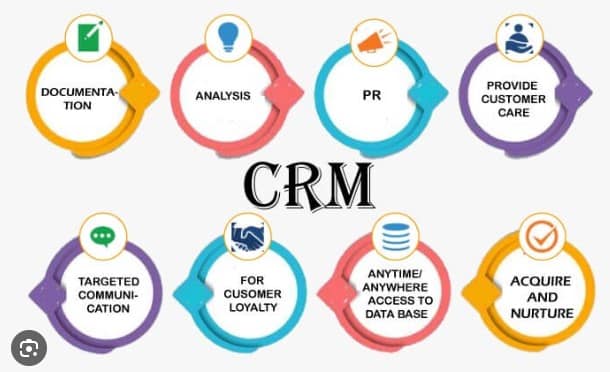Every business faces the challenge of managing customer relationships effectively. It’s like a well-choreographed dance, where one misstep can lead to a cascade of complications. Customer Relationship Management (CRM) tools are like your professional dance coaches, ensuring you’re always in sync with your customers. Today, we’ll delve deep into the intricacies of the 3 Types of CRM: Analytical, Operational and Collaborative.
Understanding the Need for CRM
The role of CRM is multi-faceted. It’s the silent supporter in your corner, guiding your business decisions and helping you steer your customer relationships towards a path of consistent growth. Let’s demystify why CRM is an essential part of your business.
Sailing in the Customer Ocean
Customers aren’t just statistics or numbers. They’re like complex, unpredictable oceans. Navigating these waters without understanding the currents and tides could be disastrous. CRM allows businesses to ride the waves of customer expectations, ensuring a seamless customer journey.
Turning Leads into Gold
Attracting potential customers or leads is just half the battle. Turning them into long-term customers is the true challenge. With the assistance of a CRM system, businesses can efficiently follow up on leads and keep them engaged, turning them into precious golden customers.
The 3 Types of CRM: Analytical, Operational and Collaborative
Let’s delve into the heart of our topic – the 3 types of CRM: Analytical, Operational and Collaborative. Each type plays a vital role in managing customer relationships, contributing to a well-rounded and holistic CRM strategy.
Analytical CRM: The Knowledge Powerhouse
If knowledge is power, then Analytical CRM is the powerhouse. It analyzes customer data, unlocking insights that drive strategic business decisions.
Sifting Through the Data Sands
Like sifting through sands for precious gems, Analytical CRM digs deep into customer data. It uses sophisticated algorithms and statistical techniques to unearth valuable insights about customer behavior, preferences, and needs.
Informing Business Decisions
Analytical CRM takes the guesswork out of business decision-making. By presenting data-driven insights, it allows businesses to make informed decisions that align with customer expectations and market trends.
Operational CRM: The Efficiency Enhancer
Operational CRM is the grease that keeps the gears of your customer management processes running smoothly. It’s all about efficiency – ensuring every process, from marketing to sales to customer service, is seamless and well-coordinated.
Boosting Marketing Efforts
Operational CRM supercharges your marketing initiatives. It allows for targeted marketing campaigns by categorizing customers based on various parameters like demographics, purchase history, and behavioral patterns.
Streamlining Sales and Services
From managing sales pipelines to handling customer service requests, Operational CRM ensures a smooth, seamless experience. It allows businesses to provide timely, personalized service, fostering stronger customer relationships.
Collaborative CRM: The Relationship Builder
Collaborative CRM is the glue that holds all the pieces of the customer relationship puzzle together. By promoting inter-departmental collaboration, it ensures every customer interaction is consistent, personalized, and meaningful.
Breaking Down Silos
Collaborative CRM smashes the invisible walls between departments. By sharing customer data across departments, it ensures everyone is on the same page, providing a consistent customer experience.
Building Stronger Bonds
Through seamless collaboration, businesses can deliver a unified customer experience. This can lead to stronger customer relationships, increased loyalty, and long-term business growth.
Strategizing CRM Implementation
Understanding the 3 Types of CRM: Analytical, Operational and Collaborative, is just the first step. The next step involves strategically implementing these CRM types in your business operations. Here’s how.
Customizing CRM to Fit Your Needs
Just like a tailor-made suit fits perfectly, your CRM strategy should be customized to fit your business needs. It involves identifying the features that align with your business goals and incorporating them into your CRM system.
Fostering Employee Engagement
Successful CRM implementation is a team sport. It’s essential to foster employee engagement, train them on the system’s functionalities, and instill the importance of CRM in achieving business objectives.
FAQs
1. What is the main difference between the 3 types of CRM?
Each CRM type serves a unique purpose. Analytical CRM focuses on analyzing customer data and deriving insights. Operational CRM streamlines business processes like marketing, sales, and customer service. Collaborative CRM promotes inter-departmental collaboration to provide a unified customer experience.
2. How does CRM enhance customer experience?
CRM enhances customer experience by enabling personalized interactions, timely service, and consistent communication. It allows businesses to understand customer needs and preferences, leading to improved satisfaction and loyalty.
3. Can small businesses benefit from using CRM?
Absolutely! CRM isn’t just for big businesses. Small businesses can leverage CRM to understand their customers better, streamline operations, and implement targeted marketing strategies.
4. Is it necessary to use all 3 types of CRM in a business?
While it’s not necessary, it is beneficial. Each CRM type complements the others, resulting in a comprehensive and effective customer management strategy.
5. How does CRM benefit employees?
CRM can make employees’ jobs easier by automating routine tasks, providing customer insights, and promoting collaboration. It allows them to focus more on delivering superior customer service.
6. How can I choose the right CRM for my business?
Choosing the right CRM involves understanding your business needs, budget, and goals. It’s also essential to consider factors like ease of use, integration capabilities, and scalability.
Conclusion
The dance with your customers can indeed be complex, but with the right CRM types: Analytical, Operational, and Collaborative, you can gracefully glide through the dance floor of customer relationship management. They’re not just tools, but strategic assets that can propel your business growth. So, take a deep dive into the CRM ocean, and watch your business soar to new heights!
Read More :
